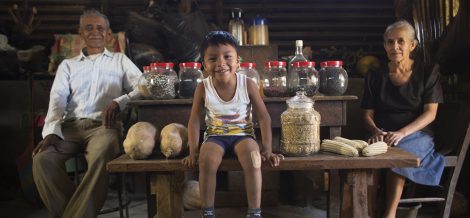“If this Summit, convened by the United Nations (UN), goes on in the same way, whatever guidelines come out of it will most likely continue promoting the industrial food systems that have made people unwell,” warns Saúl Vicente from the International Indian Treaty Council [1].
He was referring to the UN Food Systems Summit, scheduled for September 2021. Vicente added that “it would not address the policy recommendations that have come up from multilateral spaces, based on human rights and particularly the right to food.”
The activist was interviewed by Real World Radio as a spokesperson for the Civil Society and Indigenous Peoples Mechanism for relations to the UN Committee on World Food Security [2] (CFS). The mechanism is made up of social movements, smallholder farmers, peasants, family farmers, pastoralists, fisherfolk, landless people, consumers and urban populations, among others.
In October 2020, the Mechanism launched an open call [3] for engagement to “join forces and challenge” the UN Food Systems Summit, explaining that it is “going into a problematic direction”. In March 2020, nearly 550 organisations expressed their concern in a letter sent to UN Secretary General, António Guterres [4]. This letter has not yet been answered.
“Suddenly, we learned that the UN Secretary General had signed an agreement with the World Economic Forum [5] (WEF) to address food systems and hunger around the world, and was planning to convene a Food Systems Summit. This was concerning to us and we wanted to know why they were working with the WEF to begin with,” Vicente told Real World Radio. “There are spaces which have the mandate to address the issue of hunger in the world. One of these is the UN Food and Agriculture Organisation (FAO). But there is also an intergovernmental space which is part of the UN, the CFS, which has the mandate to address the issue of hunger in the world, review food systems and propose policies for governments to address these issues.”
The activist criticised the UN’s work process towards the 2021 Summit, including the role of the WEF and the participation of some of the most powerful corporations in the industrial food system, as well as the lack of inclusion for smallholder farmer organisations, those who are truly feeding the world.
Vicente denounced the corporate capture of democratic spaces [6] that weakens the human rights system. He demanded that the UN Summit respect the multilateral framework and the human right to food, as well as the right to a healthy environment, to biodiversity and climate justice.
“With this call, we are trying to build an autonomous space for movements and farmers to come up together with proposals and strategies for a deep transformation of the world’s food systems, taking into account our perspective on the human right to food, food sovereignty, the promotion of agroecological production [7], and the saving and recognition of the ancestral knowledge of our peoples in terms of traditional medicine and food”, among other things, he explained.
Vicente informed us that an assembly will be held on 3-4 December 2020 for all organisations that respond to the call for engagement [3], which is still open. In the assembly, the different social movements and organisations which are mobilising against the manner in which this UN Summit is being organised will analyse the direction this official event is taking, and explore possible actions to challenge it.
